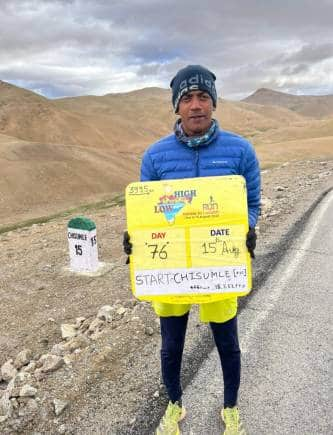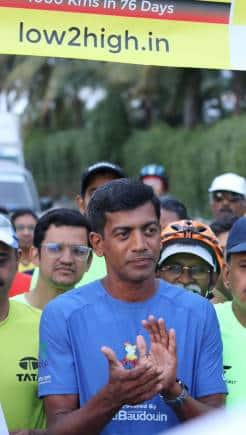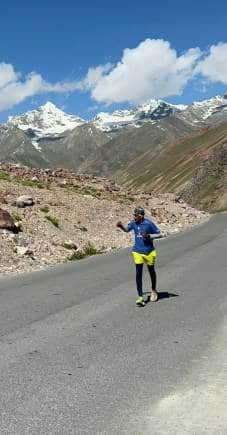



A run that starts during predawn hours and goes past the marathon distance, followed by a similar effort the next day. The countdown to the finish is calculated in days, rather than miles. There are no other runners lined up alongside; the competition is against the self.
These are ultramarathons that last for days on end, an expedition of sorts that runs over hundreds of kilometres. This could well be a road trip for the rest.
It’s the kind of projects that Sufiya ‘Sufi Runner’ and Ashish Kasodekar have undertaken over the last few years. There’s unconditional love for running, a dash of madness and the drive to inspire people to wake up in time to see glorious sunrises.
 Sufiya 'Sufi Runner'
Sufiya 'Sufi Runner'In September, Sufiya, 38, ran the 460-odd kilometres from Manali to Leh on two occasions, separated by a week. The first time, she found the going rough and missed her target of 100 hours. A week later, she came back to pull it off in 98 hours — the fastest time on the stretch, currently being ratified by Guinness World Records.
Ashish’s ‘Low2High’ project took him over 4,003km from the lowest point in India, Kuttanad in Kerala, to Umling La in Ladakh, the highest drivable road in the world. He planned it in a way that after 76 consecutive days of running starting June 1, he would be able to celebrate India’s 76th Independence Day at the pass. And along the way, he hoped to get others off the couch as well.
“I want people to know that everyone feels low at some point in life, but that isn’t the end. If you enjoy the journey, the highs will come pretty soon,” Ashish says.
***
Ashish, 52, runs a travel company in Pune and is always looking for excuses to explore new terrain while running.
After finishing the Comrades Marathon (89km) in South Africa in 2017, he put his body through gruelling tests such as the La Ultra — The High (111km, 333km and 555km) in Ladakh, the Badwater Ultramarathon in the United States and the Brazil 135 Ultra (both 217km). All through those runs, he learnt to embrace pain and soon started enjoying the company.
 Ashish Kasodekar
Ashish Kasodekar“It’s like a tattoo — it will hurt if I tell you to get one, but if it’s your own will, it doesn’t hurt so much. Besides, I love to be on my own during these runs. I’ve spent time understanding my mind and body, and realised how minuscule you are amid nature. Running in the mountains keeps me grounded,” Ashish says.
Besides the body, these kinds of efforts take a toll on the mind. At the 2016 Comrades Marathon (89km), Ashish was 200 metres from the end when he heard the buzzer go, announcing the end of the race. Though disheartened, he continued to the finish and came back stronger the next year to register a faster time.
“It’s very easy to put the blame on other factors. Had I accepted defeat and left that race with an excuse, things would have been very different. I wanted to learn from that experience and it has brought me this far today,” Ashish says.
His mental fortitude has been tested time and again. During the 333km distance of La Ultra — The High, Ashish’s mind played tricks, as he experienced hallucinations after running at altitude for close to three days. In his head, he was convinced that he had made it across the finish line, though he still had 3km to go. It took persistence and patience from the crew to get Ashish to continue, eventually completing the race just 31 seconds short of the cutoff time.
 Ashish Kasodekar
Ashish Kasodekar“Every run has taught me something. It’s made me calm and composed. My intent now is to grow this community,” he says.
He first brought people together in 2021 to ring in his 50th birthday while running 60 marathons in 60 days. During every run, he would invite friends, family and communities to be a part of it. The celebration saw mothers and daughters run together, paraplegic athletes finish their first marathon, plenty of first-timers and reunions that brought together Ashish’s friends. Each one took on a distance they were comfortable with. Because if the guy next door could pull off this ambitious project, which eventually made the Guinness World Records, so could they.
***
Back in 2017, Sufiya was part of the ground staff at Delhi airport when she ran her first half marathon. A few months later, she finished on the podium at her first ultra marathon. When she ran the 700km over the Delhi-Agra-Jaipur stretch in 16 days, she knew there was something bigger in store. That turned out to be a run from Srinagar in Kashmir to Kanyakumari (K2K), a distance of 4,000km, in 2019.
 Sufiya 'Sufi Runner'
Sufiya 'Sufi Runner'“No woman had done it before. My office didn’t understand what I was attempting, so I had to quit my job. No sponsor would come forward, since nobody thought I could pull it off. Our resources were limited, but I still hit the road,” she says.
That run stands as her favourite — not because she finished it in 87 days, her first as part of the Guinness World Records, or because it put her on the ultra running map. It was an attempt that was almost called off at the 450km mark when she suffered breathlessness and had to be taken to the hospital.
“We were ready to start at 4am. Sufiya stepped out of the car and collapsed. There was immense pain and just standing up was an effort. She spent five days recovering from an infection at a hospital in Jalandhar,” recalls her partner and crew member, Vikas Saroha.
As she sat in the hospital ward recuperating, she first witnessed the battle between mind and body. It’s been a constant on all her runs ever since.
“I’ve realised that efforts of endurance are first won in the head because the body hits a point where it simply stops functioning. If I had quit at that point, I would have suffered running phobia or sunk into depression. A positive mindset is everything, that’s where all my preparations begin,” Sufiya says.
“During the first few days, the body will always be in pain. But after a point, the mind tells the body that this is how it’s going to be. You have to run the next day and the day after that. A week into it, the body finds its rhythm. And there’s a divine power that carries me forward here on,” she adds.
After five days, she resumed the attempt and ran 75 days on the trot until Kanyakumari. Runners from different cities stepped out to join her on certain legs. Her sense of accomplishment comes from the fact that they continue to run together. And her endeavour is to grow this tribe in the time ahead.
 Sufiya 'Sufi Runner'
Sufiya 'Sufi Runner'After the K2K effort, the challenge posed by these mammoth distances had her hooked. With each run, she got stronger and she was soon back to the drawing board, planning her next big project. In February 2020, she decided to run along the Golden Quadrilateral (6,000km) highway network across India. That attempt was cut short by the lockdown due to Covid-19. By then, she had finished 2,200km.
A few months later in December, Sufiya started all over again to complete the run in 110 days.
***
Finishing a run is no longer a motive for Sufiya. The curiosity is to understand how much her body can endure. Each time she looks at a route, the idea is to make it challenging to relish the sense of accomplishment when she achieves her target.
It is why she was left unsatisfied with her first Manali to Leh attempt in August, in spite of clocking the fastest time by a woman. The body let her down and she felt like she deserved better for the four months of rigorous training. The next attempt was impulsive, though she only started after receiving the doctor’s thumbs-up.
“The challenge during the second run was the weather — hail while descending the Rohtang La and subzero temperature beyond Pang. Then closer to Leh, the heat shot up and I was severely dehydrated. My body was also fatigued due to periods. It’s the toughest run I’ve tackled so far,” she says.
 Ashish Kasodekar
Ashish KasodekarWhen Kasodekar started in Kerala, he experienced high humidity and was hammered by incessant rain as he progressed north. But he pushed on to average close to 60km during the first 40 days. Alongside, he kept an eye out on the app he had created for the run, where anyone could sign up and log the distance they were covering in their own backyard.
“I want this to be a fitness movement. Whether it’s running, cycling or hiking, people need to step out. I wanted to show them how their life would change if they were consistent over those 76 days. There was so much positivity, happiness and self belief to look forward to. And this is what gave me energy to carry on with my own run,” Ashish says.
***
On August 15, Ashish ran up the final slope of Umling La during the morning hours. Fresh snowfall greeted the team as they sang the national anthem in unison, a fitting reward for the hearty effort.
 Ashish Kasodekar
Ashish KasodekarAs he sat easy for once inside the vehicle, he thought about all the people he had spoken to during the run — the sexagenarian who had brought together others her age for morning walks, the paraplegic gentleman who had started with a step and was now logging 10km each day, and the truck driver he had met at a toll who promised to exercise daily.
And the many smiles he had spread while tackling all those own miles.
Find the best of Al News in one place, specially curated for you every weekend.
Stay on top of the latest tech trends and biggest startup news.